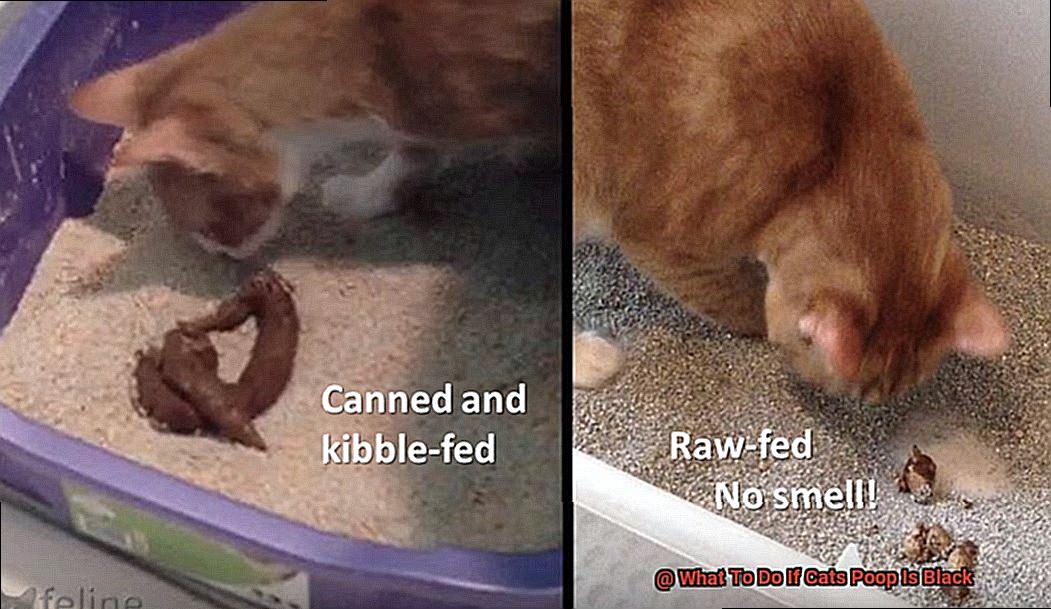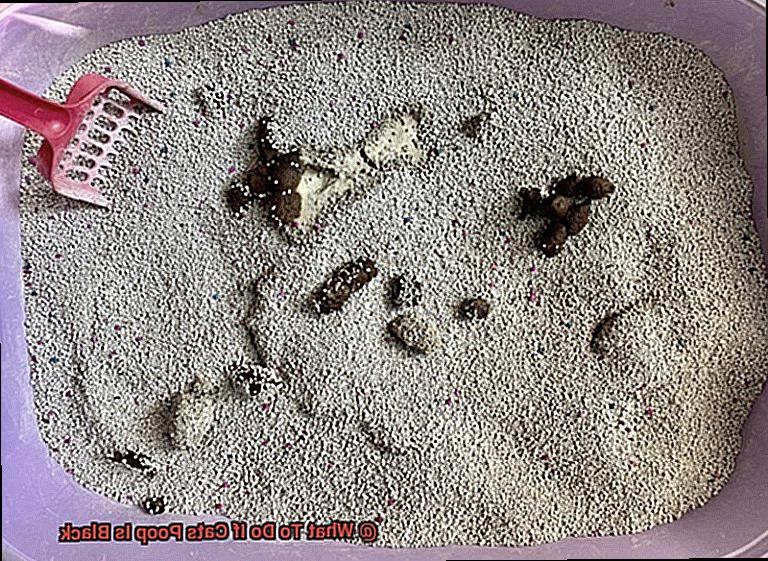Do you ever see your cat’s poop change from brown to black? If so, it can be alarming. But don’t worry. There are some simple steps you can take to identify and treat the problem.
We all love our cats and want them to be healthy and happy. That’s why it’s important to know what to do if cats poop is black. In this blog post, we’ll explore the potential causes of black cat poop and how to handle them.
So, what causes black stool in cats? It could indicate an underlying health condition that needs to be addressed. We’ll also have information on how to keep your cat from developing any issues related to their digestive system.

Once you know what might be causing your cat’s black poop, it’s time to take action. We’ll look at how to identify and treat any underlying health conditions that may be causing the discoloration in your cat’s stool, as well as some tips on preventing future issues with your cat’s digestive system.
If you’ve ever seen your cat’s poop turn black, now you know What To Do If Cats Poop Is Black. With this knowledge, you can help ensure your cat stays healthy and happy for years to come.
What Causes Black Cat Poop?
Have you ever noticed that your cat’s poop is black? While this may come as a shock, there are actually several potential causes for this phenomenon.
First and foremost, diet can be to blame. If your cat has been eating too much iron or blood, their poop will naturally turn black. Similarly, certain types of food or medications may also darken a cat’s stool color.
However, if the black color is accompanied by other symptoms such as vomiting, lethargy, or loss of appetite, it could indicate a more serious condition such as melena which occurs when bleeding in the digestive tract occurs. In this case, medical attention should be sought immediately.
Dehydration can also cause a cat’s poop to become darker in color. When cats don’t drink enough water and their body becomes more efficient at removing fluids, this can lead to a darker stool color.
Is Black Cat Poop an Emergency?
In some cases, black poop may be a sign of a serious health problem that requires immediate veterinary attention. For instance, if the feces is consistently black or tar-like in texture, it could indicate internal bleeding due to a gastrointestinal issue or even cancer.
However, there are other less serious causes of black cat poop. Eating too much iron-rich food or ingesting toxic substances like rat poison can also turn your pet’s poop black. Even so, it’s still important to take your cat to the vet and rule out any underlying health conditions that may need treatment.
What is Melena and How Does it Affect Cats?

Melena is a serious health disorder that can affect cats, and it’s essential to recognize the signs and symptoms so you can get prompt veterinary attention. Melena is caused by bleeding in the gastrointestinal tract, resulting in black or tarry stools. Common signs of melena include vomiting, lethargy, appetite loss, and black or tarry stools.
If your cat’s poop is now black or tarry, it’s imperative to take them to the hospital immediately. This condition can cause severe anemia, dehydration, and electrolyte imbalances in cats which may lead to weakness and even death if not treated right away.

Your veterinarian will evaluate the underlying cause of melena and suggest appropriate treatment options such as drugs, surgery, or diet changes.
It’s also important to monitor your cat’s behavior closely and provide them with plenty of fresh water and a stress-free environment. Before your cat’s illness is properly diagnosed and treated, avoid giving them any unfamiliar foods.
If your cat has severe symptoms of chronic disease, hospitalization may be necessary for close monitoring of their health.
How to Diagnose Melena in Cats
Melena in cats is a worrying condition that can be both alarming and concerning for pet parents. If your kitty’s poop appears black or tarry, it could be an indication of melena—a medical emergency that requires immediate attention from a veterinarian. In this blog post, we’ll explore the causes of melena in cats, how to recognize it, and the treatment options available.
The first step in diagnosing melena is for a veterinarian to perform a comprehensive physical examination. This will involve checking for any signs of gastrointestinal bleeding, which can indicate that more than 50 ml per day of blood is being lost somewhere along the cat’s digestive tract.
In addition, the vet may also recommend blood tests (CBC) to look for any abnormalities in the cat’s blood counts, as well as fecal tests, ultrasounds, or X-rays to determine the cause of melena.
It’s important to note that melena can be triggered by various conditions such as ulcers, inflammation, or the ingestion of foreign objects. Depending on the underlying cause, treatment options may vary and include medication, surgery, and blood transfusion. It is essential to follow your vet’s recommendations and prescriptions to ensure your cat makes a full recovery.
It’s vital to monitor your feline friend closely and seek medical assistance if you notice any unusual signs.
Early detection and treatment can help prevent more severe complications and improve your cat’s overall wellbeing.
Treatment Options for Cats With Melena
Cats with melena require prompt and proper treatment to ensure a full recovery. Depending on the underlying cause, treatments may include antacids or histamine blockers, anti-inflammatory drugs or steroids, or even surgery in some cases.
To aid in your cat’s recovery, it is essential to monitor their progress closely and provide them with plenty of fresh water and a high-quality diet.
In more severe cases, hospitalization may be necessary to provide medical assistance such as intravenous fluids and electrolytes to prevent dehydration and shock. If your cat has been diagnosed with melena, remain vigilant for any changes in behaviour or appetite and alert your veterinarian right away.
The healing process for melena can take several weeks, so patience is key throughout the recovery period.
Home Care Tips for Cats with Melena
Cats with melena can be a frightening and confusing experience for pet owners. Melena is a disorder that is characterized by black, tarry stools due to the presence of digested blood in the feces.
If your cat has been diagnosed with melena, it is essential to seek veterinary care immediately and follow their instructions for care. Fortunately, there are also some home care tips you can use to help your cat recover and prevent future episodes of melena.
The first step in caring for cats with melena is to keep them hydrated. Provide them with an abundance of fresh water or liquids such as chicken broth to prevent dehydration, which can cause further complications and delay recovery.
Additionally, switch their diet to a high-quality, easily digestible food that is low in fat. This will help reduce the strain on their digestive system and help their body absorb nutrients more efficiently.
You can also give your cat supplements like vitamin B12 and iron to help boost their immune system and promote healing. However, it is important to consult with your veterinarian before giving your cat any supplements to ensure the proper dosage and administration.
Furthermore, monitor your cat’s behavior closely and watch for any changes in their behavior, appetite or stool.
Give them a quiet resting space away from noise or other animals so they remain comfortable and not stressed out.
When to Seek Veterinary Attention Immediately
When it comes to your cat’s health, it’s important to know when to seek veterinary attention immediately. If you notice that your cat’s poop is black, this could be a sign of a serious problem that requires urgent attention from a veterinarian.
One possible cause of black poop in cats is melena, which is the result of bleeding in the upper portion of the digestive tract. Causes can range from ulcers and tumors to foreign objects ingested by the cat. If your cat’s poop is black and tarry in consistency, this is an unmistakable sign that they need to see a vet as soon as possible.
Another potential cause of black poop in cats is ingestion of certain medications or toxic substances. If you know that your cat has ingested something hazardous, or if their medication appears to be causing the problem, it’s essential to seek veterinary attention right away.
It goes without saying that if you notice that your cat’s poop is black, you should take them to the vet immediately.
Delaying treatment can lead to dangerous complications and even life-threatening health issues.
Prevention Strategies for Avoiding Melena in Cats
Your beloved feline companion’s health is of utmost importance, and preventing melena is a key part of that. Melena, which is caused by bleeding in the digestive tract, is a common issue for cats.
Luckily, there are several strategies you can use to prevent this condition from occurring.
The foundation of prevention is providing your cat with a nutritious, high-quality diet that meets all their nutritional needs. This will help reduce the chances of any gastrointestinal issues that could lead to melena.
Additionally, ensure your cat has plenty of clean water available at all times and make sure they receive regular check-ups from the vet.
It’s also important to keep your cat’s environment free from any potential toxins or harmful substances.
This includes keeping medications and cleaning supplies out of reach, removing any toxic plants from the home, and being cautious when introducing new foods or treats into their diet.
Conclusion
If you ever notice your cat’s poop is black or tarry in texture, it’s important to seek veterinary attention right away. This may come as a surprise, but there are several potential causes for black cat poop, such as diet or even more serious conditions like melena.
Fortunately, with the right knowledge and home care tips, you can continue to care for your feline friend. Early detection and treatment are key in preventing further complications and ensuring your cat makes a full recovery.
To reduce the chances of melena or other gastrointestinal problems occurring in the future, provide them with a balanced diet, plenty of clean water, and a stress-free environment.

